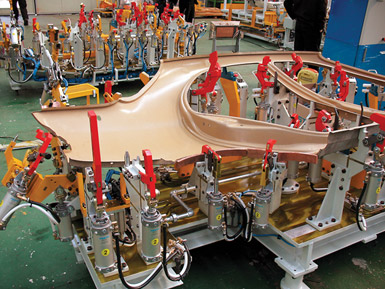Walton: We believe in innovation and the empowerment of all companies, small or large, and we build products to do that. We do studies on companies that use our products for collaboration and empowerment to change their culture. We find that those that are publicly traded have higher stock prices after they do a digital transformation than before. I think innovation is core to manufacturers, core to retailers, and core to other industries as well.
AD: What kind of challenges do small companies face in terms of innovation?
Walton: We usually see the most innovation with new companies and small teams. It’s always been some group of people with ideas. But small manufacturers today in the U.S., with less than 50 employees, spend two and a half times the amount of money on managing benefits and regulatory compliance, as do large manufacturers. Small companies are probably the most innovative, but they are being handicapped right out of the gate, as compared to large companies. We need to remove these barriers.
AD: What do you feel will happen if manufacturing doesn’t embrace innovation?

AD: What role does leadership play in creating a culture of innovation?
Walton: Leadership is key, but it has to be the right leadership. Does the VP of engineering get ?to give an opinion on innovation at the C-suite at a large company? Most typically not. At large companies the CIO does not get a standard vote, nor do the VPs of production. Neither do the VPs of quality or supply chain management. All the people who are responsible for making a product better, faster, and cheaper don’t have a voice at the innovation table at the C-suite. There’s the disconnect, and it has to change.
AD: Embracing innovation also can mean embracing failure. Please explain.
Walton: One of my most successful programs was at a company where we transformed multiple plants in their product quality, inventory, and maintenance. They were able to react faster than they ever had before. But the program was considered marginally successful at the C-suite and director level because it went 6 percent over cost. Companies say, “Please help us, we need this technology.” Their margins and market share are eroding, but program heads are afraid of some innovation because if it fails, they could get fired. And that’s the wrong culture, period.
AD: How important is it for manufacturing companies to embrace failure as a learning tool?
Walton: Most companies do not celebrate failure. We always look at the top-performing companies in the world that are considered the most innovative. And I can tell you they have a culture of innovation and collaboration. While they may not be fully there, they are on the voyage of collaboration, transparency, and ideas everywhere. On top of it, these top-performing companies don’t have retribution for failure. They celebrate lessons learned. That’s simply not the case at other less performing companies, whether they make plastic, food, or airplanes.
AD: Tell us about the manufacturing maturity model.
Walton: The Association for Manufacturing Excellence is changing how they assess the AME Excellence Award for the manufacturing maturity model. They feel like they’ve needed to take a step back and ask more questions. For example, “We saw incremental improvement, but were the ideas sustainable? Was it the idea of someone at the top, or was it an idea from everywhere? Did we really listen?” So in the future there is going to be an innovation component for companies to be evaluated by the manufacturing maturity model. That’s a big change. Instead of asking, “Are you LEAN? Do you have Kaizan? What’s you safety record?” Now they are asking things like, “Are you collaborative? Do you celebrate failure? Are you innovative?” Those are different questions from “Do you do R&D? Do you have sustainable processes for LEAN?”
AD: Are large companies on board with creating a culture of innovation?
Walton: It’s just recently that the very large compa-nies took us seriously in the manufacturing industry. That’s in large part because they keep acquiring smaller companies that are already lean and advanced. Large companies find out these smaller companies are built on these technologies and they need to be taken seriously.
AD: Tell us about Google for Work.
Walton: We take products that we’ve created worldwide and we’ve created an enterprise called Google for Work. It’s the enterprise edition of those tools for companies to find information faster. The products help companies collaborate better, have a voice of empowerment, be better able to collect data from almost anywhere, and be able to analyze that information. Google for Work helps companies make decisions with real data, not opinion. In short, we are bringing back mission to the marketplace.
AD: How does a company know it has embraced a digital and innovative culture?
Walton: We are working with a manufacturing company right now. Their language changed. They now say, “We are a digital company that makes electronics.” If you think like that, you can be a leader in the world today. Some companies are embracing this future. Others are not. We are at the epicenter. The cusp has already passed. We are now at the cliff of those who do and those who don’t.